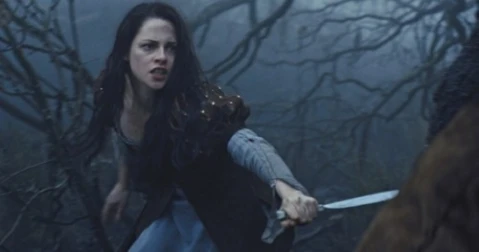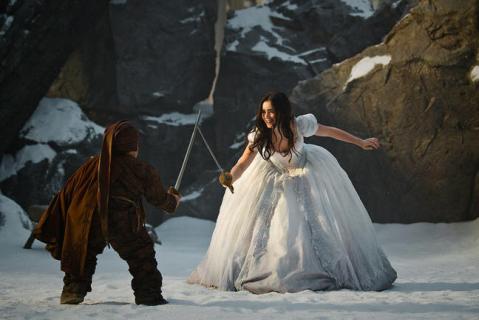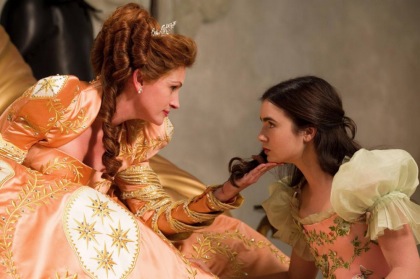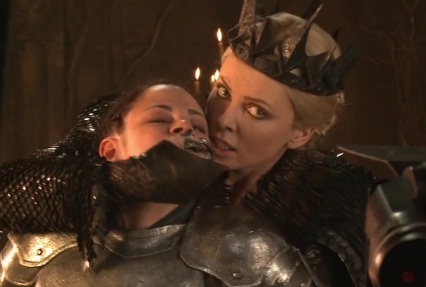Mirror, Mirror, on the Wall: Who Has the Most Girl-Power of Them All?
June 20, 2012 § 12 Comments
Below is a freelance article I wrote after the release of Snow White and the Huntsman. Though it didn’t get picked up for publication this round (among other reasons, the fact that I misspelled the name of the magazine’s editor in the email wasn’t a winning move), I’m pretty proud of it, and want to share it with you–it’s not just a review of the film, but a comparison between the two Snow White films that came out this spring, and a call for more empowered and honest depictions of women in fairy tale films. Too tall an order? We’ll see…
So it’s pretty clear that 2012 is the year of the pure white virgin with gumption. Snow White and the Huntsman won the box office its first weekend over such nostalgic temptations as Men in Black III and Battleship—to really hook an audience, you have to go farther back than their middle school years. Way back. Two hundred years back, even. Many of you readers may be aware already that this year marks the bicentennial anniversary of the Grimm brothers’ Nursery and Household Tales. It seems that big-budget studios are helping audiences celebrate with last fall’s fairy tale themed shows Once Upon a Time and Grimm and films such as the upcoming Jack the Giant-Killer and Maleficent (a new take on Disney’s Sleeping Beauty).
The fairest tale of them all, however, is the one getting the most Hollywood attention: the Grimms’ “Snow White,” the inspiration for not one, but two feature films this year. The afore mentioned Snow White and the Huntsman, now in theaters, is a medieval fantasy epic starring Kristen Stewart as Snow and Charlize Theron as her black-hearted stepmother, Queen Ravenna. A darkly hued, adventure-heavy take on the fairy tale, Snow White and the Huntsman is interesting enough to warrant positive reviews on its own, but in comparison to this year’s earlier offering, Relativity Media’s Mirror, Mirror, is even more deserving of a closer look. The light-hearted Mirror, Mirror starred Lily Collins as Snow and Julia Roberts as her vain, tittering stepmother. Both films attempt—with varying degrees of sincerity, I might add—to endow lovely Snow with a little more bite as a feminine role model. But here’s the trouble: when fiddling with stories that have been told and retold for over two hundred years, it takes more than a princess with a sword to tell a tale that truly speaks to women.
This year’s fluffier take on the Grimms’ “Snow White,” Mirror Mirror, was the first of 2012’s Hollywood Snow Whites to outfit the title heroine with a sword instead of a dishrag. Just before the final victory, Lily Collins (as Snow White) tells her prince to stay behind as she sets out to save the day all by herself, saying, “I’ve read too many stories in which the princess is saved by a handsome prince.”
Said handsome prince looks on wistfully.
“I think it’s time we changed that ending.”
This is all fine until the prince and the dwarves come to her aid anyway.
I went to see Mirror, Mirror all by myself on a Saturday afternoon in March, and wolfed down a $9 hot dog while a two-year-old down the aisle screamed her head off. I sympathized. But it wasn’t just the cringe-worthy writing or massive plot holes that had me writhing.
What stuck with me as I sat in that dark theatre were the murmurs of approval I heard throughout the audience as Lily Collins, as fair as fairest in the land can be, uttered this line—”I think it’s time we changed that ending”—so sweet and so placating it should be embroidered on a pillow and sold at Bed, Bath and Beyond. And I admit, a small part of me agreed. Right on, that part of me cheered. You change that ending, girl. By the end of the film, though, I felt like I was being kidded.
The tradition of reclaiming fairy tales in the name of female empowerment is a long and exciting one—what could be more satisfying than twisting a tale that has its roots deep in patriarchal cultures of old? Like so many fairy tale lovers and scholars, I adore these tales despite their deep ties to patriarchal gender roles, and not because of them. So I am, in theory, all for the myriad of creative re-imaginings of Snow White on offer. But this particular affirmation felt suspect—it seemed as though I wasn’t cheering a new, empowered heroine, but only the shell of one. And when it comes to armoring generations of women against a patriarchal worldview so complete that two-hundred year old tales still persist in rehashing it, a shell of empowerment can be worse than none at all.
In Mirror, Mirror, we cheer when Snow White is successful in restoring her father to the throne, even though we’re told by the narrator at the beginning of the film that Snow herself has been groomed to lead. We cheer again when she kisses the Prince and releases him from an evil spell, instead of being kissed herself (her reward? Being told that she tastes “like strawberries”). We clap and laugh when Snow offers an aged Julia Roberts (as the Queen) the first bite of the tainted apple, cheerfully delivering the grating line, “Age before beauty,” as if age is something she’ll never have to worry about.
Whatever the sound bytes say, Snow still ends up under the thumb of both a husband and a king, while the kingdom thanks her for her role in removing the only interesting and, dare I say it, relatable character—the Queen—from her place of power. And that hardly sounds like a new empowered princess to me.
It just goes to show that a story about two archetypal women pitted against each other—a story in which the pretty one MUST win, or it just isn’t the same story—is a tough nut to reclaim in the name of girl power. “Snow White” isn’t merely a tale about good versus evil, with a girl coming out on top. It’s a tale about women versus women: one is young and beautiful, and the other is aged, and afraid that all of her worth lies in being beautiful.
There’s no denying that the Queen—whether she be played by a flighty, petty Julia Roberts or a frighteningly alluring Charlize Theron—is a baddie. Though second wave feminists Gilbert and Gubar made a convincing case in their 1979 article “Snow White and Her Wicked Stepmother” for the Queen as an “artist,” there is still that tiny problem of attempted murder. But consider this: what’s truly “bad” about the Queen on a symbolic level is that she’s old, and she hates herself. She’s active in this hatred—she takes charge of her fate rather than having her fate thrust upon her—and she’s in possession of some stereotypically negative female wiles: jealousy, envy, and general “bitches-be-craziness.” To truss Snow White, the paragon of virginal placitude, up in fighting gear and send her off to kill the Queen doesn’t erase the far more pervasive problems with feminine stereotypes and female relationships in this story (to say nothing of Mirror Mirror’s Prince ass-slapping Snow White with the blunt side of his sword during a duel. Girl-power? I think not). If this is what a new generation of fairy tale enthusiasts are being told is “empowering,” then it seems little wonder that we are where we are today with regards to the so-called “War on Women.” Of course there’s a war on real women. How could there not be, when there’s a perpetual war between women?
But let’s look on the bright side, and contrast Mirror, Mirror with this month’s blockbuster Snow White and the Huntsman, which pulled in $56.3 million its first three days in theaters—solidly beating the pants off of Mirror, Mirror’s $18 million opening weekend. In this darker (and much gooier) version of the Grimms’ tale, Kristen Stewart as Snow channels Joan of Arc in a gleaming set of armor, as she delivers a pretty convincing St. Crispin’s-esque speech, and leads an attack against the evil Queen Ravenna, played by the delightfully demented Charlize Theron.
After enduring the faux female empowerment of Mirror, Mirror, I can hardly describe how refreshing it was this to see that, despite some odd character motivations and the irritating insistence that Kristen Stewart as Snow White is a child of destiny (just because she’s pretty? Hmm), Snow White and Huntsman actually emerged as an interesting film, one that showed the powerful yet vulnerable sides of both female characters. Though every time Kristen Stewart was on screen I longed to be in Charlize Theron’s terrifying presence again, there’s something to be said, in the name of female empowerment, for a film that (spoiler alert) doesn’t end with a wedding. Even better, the film shows, albeit briefly, the connection between the two lead women that are actually much more closely connected than Mirror, Mirror (“Age before beauty” says it all) would have us think.
Queen Ravenna has a vendetta against men and some serious Mommy issues—we see, in flashback, Ravenna’s mother casting a spell that will endow the future Queen with magical powers, telling her that “your beauty is all that can save you” (but not the ability to transform into a flock of ravens? Interesting), which sounded like it could have been a line stolen from an episode of Toddlers in Tiaras. Though I craved more from Ravenna’s origin story, this tidbit was enough to explain some, if not all, of Ravenna’s murderous motivations. Other astute reviewers have argued that Ravenna’s character shows classic signs of rape and abuse, which seem hinted at in the flashback. Regardless of fully fledged motivation, she’s deliciously evil throughout the film, a humanoid plague dressed up in gowns made of feathers and claws. But despite her unhinged malevolence, she resembles more of a desperate, understandable human being than poor Julia Roberts was given the opportunity to in Mirror, Mirror. A striking shot of Theron’s almost skeletal bare back as she plots, hunched at a dressing table, evoked more pathos and fear in me than any of Roberts’ wisecracks, and it made me think, too about what a successful, progressive retelling of “Snow White” actually requires. It’s not Snow White alone who needs reinvention in order to turn this tale of warring women into something that speaks more truthfully to a woman’s experience of the world. The Queen needs her bite as well—and for the other characters in the film to see her as something more than just evil.
For your consideration, the most chilling scene in Snow White and the Huntsman: Snow White has slain Queen Ravenna (you didn’t need a spoiler alert for a tale that’s two hundred years old, did you?), and on Kristen Stewart’s otherwise expressionless face, tears begin to fall. She watches Charlize Theron perform an excellent series of death croaks, then stands and regards her own face in the proverbial mirror, with Queen Ravenna’s inert body heaped below. Despite Stewart’s earlier insistence that “I’m everything you’re not,” this gaze into her own reflection reveals the truth underneath the fairy tale: that both women possess beauty, but also the capacity for envy, the desire for power, and the fear that all the power and beauty they possess will one day melt. Snow White and the Huntsman had its flaws, but let’s give credit where it’s due: if we’re ever going to see a truly empowered female fairy tale heroine, one who can defeat evil but also recognize her complacency in evil’s rebirth, then it must include a moment like this, when Snow White, having won today, must pause and think about tomorrow—for tomorrow, she’ll be one day older.
I take heart in the fact that Snow White and the Huntsman won the battle of the box office that first weekend. Is it a perfect film? By no means. But if the fairy tale continues to soar in popularity, here’s hoping that future big-budget retellings continue to be imbibed with these small moments of truth, and self-awareness in their female heroines. True, there will be fewer kiddie birthday parties planned around the matinees of films in which one is forced to confront and question—rather than blindly perpetuate—the female archetypes that thrive in our age-old stories and politics. But considering that the 2012 Miss USA Pageant scored upwards of 6 million viewers the same week as the film’s release, yet Washington DC can’t even get a female legislator on a panel about birth control, I for one am happy to watch the princess culture take a hit. After all, if we perpetually tell our daughters that the most wonderful thing they can be is beautiful, and that there’s no connection whatsoever between the princess and the hag, then they’ll be pretty pissed at us when they look in the mirror one day and see a face that, according to the old story, has no more worth.
Tagged: fairy tales, feminism, film, Gilbert and Gubar, Grimms' fairy tales, Mirror Mirror, Snow White and the Huntsman




At work, so the most insightful comment I have to offer is “Yaaaay, Cate!”
But I’ll be back. This is a great post, so much to chew on.
Thanks, love 🙂
Reblogged this on The Haberdasher and commented:
We want you to come write for us! Particularly loved the final paragraphs, including the description of looking in the mirror and arriving at the realization of ones own complicity.
Hey, I like writing! Sock it to me. Thanks so much for reading, ye of the Haberdasherie. I’ve really appreciated the encouragement!
Awesome article! I enjoyed that in Snow White and The Huntsman that Snow White had empathy for the evil queen, rather than just seeing monster to be destroyed.
Thanks, Jennifer! I did too 🙂
Really great article! Thanks so much!
I haven’t seen Mirror, Mirror yet, but I agree with your analysis of Snow White and the Huntsman. Queen Ravenna – and Theron’s acting of her – made the movie for me. And that mirror moment at the end had me shuttering, “Don’t do it, Snow White, don’t become her!”
It was interesting to me that there was no explicit mention of Snow White being more physically beautiful than her stepmother. So I was glad of that, the inference (though weak) that Snow White had inner beauty that helped her defeat the wicked queen.
I have no problem with archetypes. On the contrary, I believe there can be profound truth to them.
Amazing and insightful article ❤
Thanks for reading, Marieke!
[…] Mirror, Mirror, on the Wall: Who Has the Most Girl-Power of Them All? (somethingtoreadforthetrain.wordpress.com) […]
[…] Mirror, Mirror, on the Wall: Who Has the Most Girl-Power of Them All? (somethingtoreadforthetrain.wordpress.com) […]